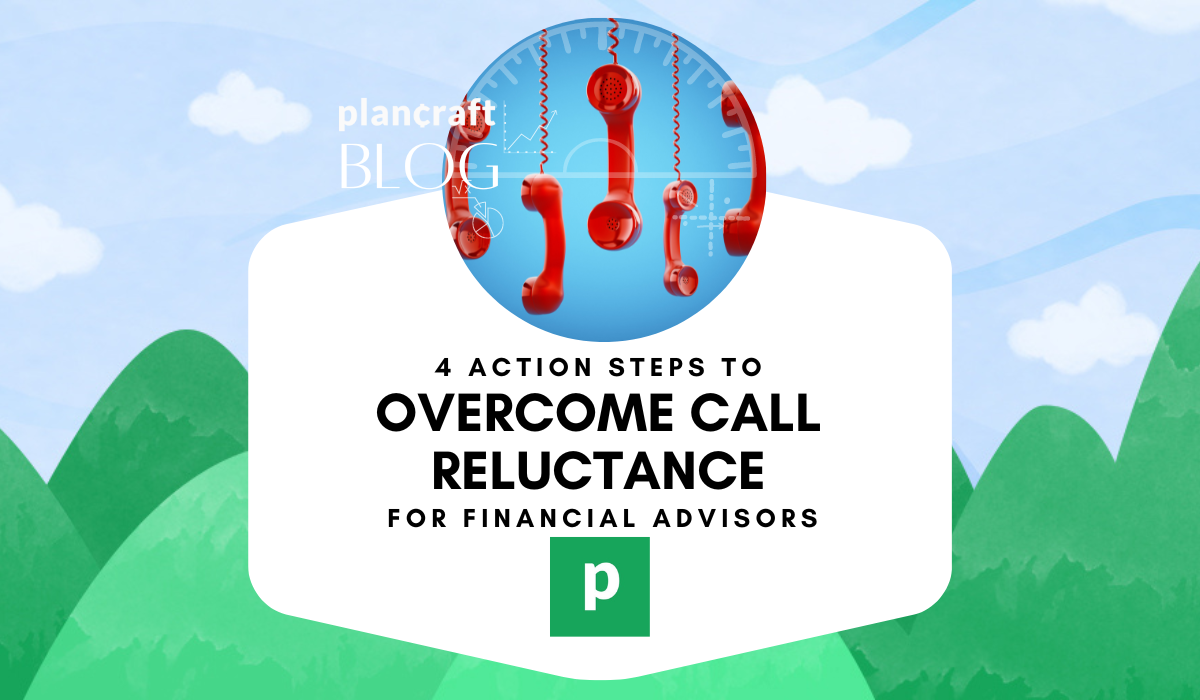If you’ve been in the financial advising game for a while, you’ve probably picked up some tricks and techniques from colleagues along the way that helped you close more business. Those little morsels of advice are now paying dividends as the years go by.
At Planswell, we’ve bottled a collective brain trust and serve it up ice cold in regular “meetings of the minds” among our partnering advisors—we call this program “Plancraft”. In these meetings, advisors share what’s working, what isn’t, and what they’ve learned the hard way.
It was in one of these meetings where I picked up on some habits that separate the top advisors from those who struggle. I was in awe. I hung on every word. I feverishly took notes. I made a list. Wait. “Is this privileged information?”, I wondered. “Am I allowed to know this?”
It turns out, these weren’t secrets at all. Wisdom flows freely in Plancraft meetings.
So, with full permission from the powers that be, I’ll spill the beans. Here is what successful advisors do:
1. Have genuine conversations
Nobody wants to talk to someone they think is trying to sell them something; on the other hand, basically everyone likes to talk about themselves. This makes for some fairly simple math on your end: when you call prospects, you have to have real, genuine conversations with them that don’t feel like sales calls.
Mary Jane Copps (a.k.a. “The Phone Lady”) trains financial advisors and life-licensed insurance agents on how to connect with prospects better over the phone. She’s given dozens of webinars for Planswell advisors on a whole slew of phone sales topics, but one of her main talking points is about the importance of having great conversations.
She explains the secret to doing this is to forget you’re calling this prospect to make a sale. Instead, simply “be you and be really interested in the other person.” If you ask thoughtful questions, listen actively, and demonstrate genuine empathy, the person you’re speaking to will be more at ease and less skeptical; they might even enjoy your conversation, which is the best possible outcome as far as closing is concerned.
At the end of the day, in order to earn someone’s business, you must first earn their trust, and that’s going to involve making them forget that you’ve called to earn their business in the first place.
2. Be persistent
Guess who doesn’t call prospects back: telemarketers (i.e. people who are only calling because they want to sell something and couldn’t care less about the person on the other end of the line so long as they agree to buy whatever’s being sold.)
That’s not you, though.
You’re calling because you offer a service that will improve the life of your prospect. You’re calling because you care about this person’s ability to access the lifestyle they want and retire at a reasonable age without having to make compromises to the lifestyle they’ve come to enjoy.
When you truly believe what you have to offer is of value, then it is not only in your best interest to call your prospects a second or third time; it’s in their best interest as well. Employing the double- or triple-dial method will distinguish you from sketchy telemarketers and show you care enough about the service you provide (and the person to whom you’re providing it) to be persistent about getting in touch.
If you can demonstrate to your households that you’re willing to put in the work for them before you even get them on the phone, you’ll have gone a long way towards earning their trust.
3. Move past failure
More than anything else, failure is a mindset. Not closing a prospect isn’t a failure, it’s an inevitability. Nobody closes 100% of the time, not even Planswell legend Ermos Erotocritou. In fact, he (and basically every other successful person in the world), says "failure” is essential to future success.
Why is the internet riddled with hundreds of pithy quotes about the value of failure? Because it’s true. Here’s another question: what’s the difference between a successful person and someone whom you might consider a failure? Both people experience setbacks; both people have been hung up on; both have had doors slammed in their faces. The difference is in how they choose to react when things don’t go according to plan.
Your initial reaction to such setbacks might be anger or frustration, and that’s understandable: it’s okay to be bummed out when you take a swing and miss. But dwelling on these feelings isn’t going to help anyone. In fact, it will do a lot of harm to your business (and, consequently, your potential households who will not gain the benefit of your services as a result).
I’m going to go ahead and adapt a Yoda quote here for illustrative purposes: Anger is the path to the dark side. Anger leads to misplaced blame. Misplaced blame inhibits growth. Without growth, there can be no success.
Basically, if you dwell on the prospect that got away, you’re more likely to blame something outside of your control that didn’t really have anything to do with why the sale didn’t happen (e.g. “ugh, phone calls don’t work.”).
Instead, you should see every “failure” as a learning opportunity. Reflect honestly on how the call went and see what you can learn from the experience. Record your calls and listen back to them: where did things go south? At what point did the prospect seem to lose interest? What could you have said or done differently to keep them invested?
Reflecting openly and honestly with yourself in this way is not easy. It takes time and effort. They say, however, that nothing worth doing is ever easy, and this is definitely worth doing: it’s the best way — perhaps the only way — to ensure you’re learning from your experiences, and that’s what will lead you to success.
4. Be RADIANT
We already mentioned legendary Planswell advisor Ermos Erotocritou. He shared this acronym to keep important concepts front of mind:
Rapport — we’ve touched on this already, but it’s worth noting again that nobody wants to buy anything from someone they think only wants to sell them something. Having genuine conversations that aren’t directly related to the services you can provide will make your prospects more at ease and less skeptical.
Altruism — nobody is going to do business with you unless they believe you’ve got their best interest at heart. Making clear that (and how) your services are important is essential if you hope to close. Remember that you’re providing a valuable service: you don’t need your prospect; they need you.
Demonstrated expertise — don’t just know what you’re talking about, show your prospects you know what you’re talking about. Showing your households that you’re a thought leader in the field will help build trust in you as a service provider. Writing a monthly blog, recording helpful FAQ videos, and posting useful content consistently to your social media channels are great ways to demonstrate your trustworthiness as an advisor.
Integrity — people who seek out financial advice want to feel confident their advisors are working in their best interests, not merely fishing for commission checks. You’ll want to do everything in your power to show your clients your primary interest is in their financial wellbeing. To that end, be sure to follow through on commitments you make, keep the conversations you have confidential, and — most importantly — focus on providing advice that will help your households in the long run. If a household believes you operate with integrity and in their best interest, they’re much more likely to refer friends and family to your services, and you’ll earn much more business in the long run.
Actively listen — this is an essential skill for building rapport and establishing trust with a prospect. This means not only absorbing information, but processing it and asking follow-up questions. Actively listening will show a household you care about them and their future, and go a long way towards earning their business.
Nurture the relationship — your relationship with a household doesn’t end once you’ve earned their business. Far from it, in fact. You should keep in regular contact with them to give updates, check in on their progress towards their goals, and make adjustments to their plans as necessary. Doing so will not only ensure they get the most out of your services, but it also demonstrates you care about their success. If they know you care about them, they’re much more likely to refer you to friends and family or even buy additional products from you in the future.
Transparency — be open and honest with your households and ask them to do the same. Nothing destroys a positive working relationship more quickly than dishonesty, secrets, and mistrust.. It’s always better to admit a mistake and explain how you’re going to rectify it than try and bury it under the rug.
Having great conversations, calling prospects back, and moving past failure are essential steps in bumping up your close rate. And, of course, if all else fails, remember to always be RADIANT.








.png)
